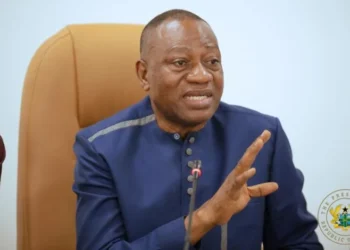Prof. Godfred Bokpin has stated that Ghana’s debt is a major challenge right now and perhaps the most discussed item in the country apart from the depreciation of the local currency.
According to the Economist and Professor of Finance, there is a link between the rising debt and the Cedi depreciation and other macro measures that are beginning to emerge. He explained that the Cedi depreciation is worsening the country’s debt situation as interest payments continue to rise with the persistent fall in the local currency.
Speaking on the history of the country’s debt, Prof. Bokpin pointed out that Ghana benefited from the HIPC initiative which was completed in 2004 and the Multilateral Debt Restructuring Initiate (MDRI) which also concluded in 2006. After the end of these initiatives, public debt dropped significantly to 26% of GDP.
He explained that the drop in public debt meant that Ghana had the fiscal space to inject growth through external debt financing. Though he acknowledged that there was nothing wrong with borrowing, he questioned how prudently the money borrowed was used.
“So, because of the fiscal space that Ghana had after the HIPC, MDRI initiatives, Ghana formally divorced its relationship with the IMF in 2006 when we exited the IMF Growth and Poverty Reduction Facility and on the back of a strong credit rating then, we went to the market to issue our first euro bond in 2007. Since then, the rest has been history.
“Debt has ballooned astronomically to current unsustainable level but that is not so strange if you understand Ghana very well and of course, it’s reminiscence of Ghana of old, Ghana of now and if we are not careful, it will be Ghana of tomorrow. Why is this so? It’s because Ghana has struggled to manage her debt since independence, reflecting revenue underperformance and inefficient and bloated expenditure”.
Prof. Godfred Bokpin
Drivers of Ghana’s Recent Debt
Speaking on the drivers of the country’s current debt, Prof. Bokpin said one of the major reasons is the failure to transform the Guggisberg inherited economy, predicated on the export of primary commodities such as gold, cocoa, and lately oil which make up over 80% of the country’s export earnings.
He explained that Ghana is volatile to development in the global commodities market and is being affected by almost every commodity shock that erupt since independence.
Prof. Godfred Bokpin also cited unproductive use of borrowed funds by government, higher borrowing costs, fiscal indiscipline, election-related excesses, COVID-19 and Russia-Ukraine war, inflation, and exchange rate developments as some of the reasons why the debt keeps on accumulating.
He indicated that the global financial architecture is anti-African which resulted in what is termed the ‘African Risk Premium’, which is an additional cost African countries have to bear in order to get credit from multinational lenders and is estimated at $2.5 billion annually. This is impacting the debt stock of Ghana and other African countries, he said.
Prof. Godfred Bokpin added that the false hope of endowed fiscal space as a result of rebasing of the economy and the conferment of middle-income status are other drivers of the country’s appetite for borrowing. He explained that since assuming this income status, Ghana started borrowing but it didn’t have the fundamentals of a middle-income country because most of the countries in that category do not depend so much on primary commodity exports.
He also cited the financial sector clean-up as one of the reasons why debt has risen to the current level, which he said, should have been done at a minimal cost.
Prof. Bokpin urged the government to begin debt restructuring arrangements with some multilateral lenders, and also suggested that just like the way the President was regularly updating Ghanaians during the height of the COVID-19, Government should periodically update Ghanaians on the state of the country’s debt situation. According to him, this will help moderate economic uncertainties.
He also urged the government to adopt a lean government that reduces the number of ministers and the number of ministries. Prof. Bokpin said the lean government should also extend to the legislature to reduce the number of MPs because “we don’t need 275 MPs in this crisis moment”.
READ ALSO: President Akufo-Addo Enskinned Chief Of Truth At Daffiama-Bussie-Issa























